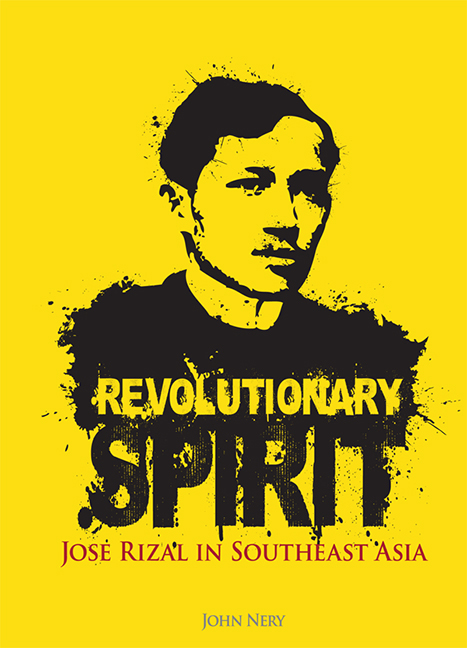Book contents
- Frontmatter
- Dedication
- Epigraph
- Contents
- Foreword
- Message
- Preface
- Acknowledgements
- INTRODUCTION The Uses of Error A Rizal Chronology
- 1 TURNING POINTS
- 2 “THE VERY SOUL OF THIS REBELLION”
- 3 DOCTOR RIZAL
- 4 “HALFBLOED”
- 5 “NO MARX OR LENIN”
- 6 UNDER THE SOUTHERN SUN
- 7 THE HOPE OF MILLIONS IN ASIA
- 8 “HIS NAME IS SWEET IN OUR MEMORY”
- 9 THE MYTH BUSTERS
- 10 “A GREAT HISTORICAL EXPERIMENT”
- Epilogue
- Appendices
- References
- Index
6 - UNDER THE SOUTHERN SUN
Published online by Cambridge University Press: 21 October 2015
- Frontmatter
- Dedication
- Epigraph
- Contents
- Foreword
- Message
- Preface
- Acknowledgements
- INTRODUCTION The Uses of Error A Rizal Chronology
- 1 TURNING POINTS
- 2 “THE VERY SOUL OF THIS REBELLION”
- 3 DOCTOR RIZAL
- 4 “HALFBLOED”
- 5 “NO MARX OR LENIN”
- 6 UNDER THE SOUTHERN SUN
- 7 THE HOPE OF MILLIONS IN ASIA
- 8 “HIS NAME IS SWEET IN OUR MEMORY”
- 9 THE MYTH BUSTERS
- 10 “A GREAT HISTORICAL EXPERIMENT”
- Epilogue
- Appendices
- References
- Index
Summary
The notice took up a mere column inch of premium newspaper space.
“Memperingati Jose Rizal”
Pada hari Sabtoe, tanggal 30 Des. moelai poekoel 8 10 malam oleh radio Djakarta akan disiarkan pidato oen toek memperingati hari wafatnja Dr Jose Rizal, poedjangga patriot Filipina. Pembitjara: toean Rosihan Anwar.
The announcement, a “commemoration of Jose Rizal,” ran at the top of the back page of the 29 December 1944 issue of Asia Raya. Like other newspapers allowed to publish by the Gunseikanbu, the Japanese military administration, the Indonesian-language Jakarta daily was limited on most days to two pages.
On Saturday, 30 December, from 8 to 10 o'clock in the evening, Jakarta radio will broadcast a speech to commemorate the death of Dr Jose Rizal, Filipino poet [and] patriot. Speaker: Mr Rosihan Anwar.
The notice was inserted in between a three-column reconstruction of a speech by Mohammad Hatta, the prominent nationalist who would in eight months’ time co-proclaim the independence of Indonesia, and a two-column feature on “religious space.” Hatta's speech sought to explain how education could help achieve Indonesian independence, and included a useful sectoral analysis of Indonesian society at the end of 1944 (Dahm 1969: 285). The religious feature, prompted by the prospect of reciprocal visits between Christian pastors and leaders of the “Masjoemi” Muslim association, carried the headline “The basics of working together.”
The leftmost column was occupied by news briefs running under the heading “Mata Hari” — a sort of intelligence round-up, aptly named. The first item defined what was at stake in the ongoing war in the Philippines, two months after the American general Douglas MacArthur kept his famous promise and landed in Leyte: “our destiny as nations of Greater East Asia, at any time, depends on whether or not our soldiers who fight for their life in the Philippines are victorious.”
But in the last days of 1944, the hope of Japanese victory, whether in the Philippine campaign or in the Pacific as a whole, had already grown faint. The stories on the front pages of the Asia Raya were a mixture of desperation and bombast. The main, four-column headline of the 29 December issue read: “Over half a million Americans die in A. T. R. war,” the initials standing for Asia Timoer Raja — Greater East Asia, the Japanese imperial project.
- Type
- Chapter
- Information
- Revolutionary SpiritJose Rizal in Southeast Asia, pp. 143 - 160Publisher: ISEAS–Yusof Ishak InstitutePrint publication year: 2011

